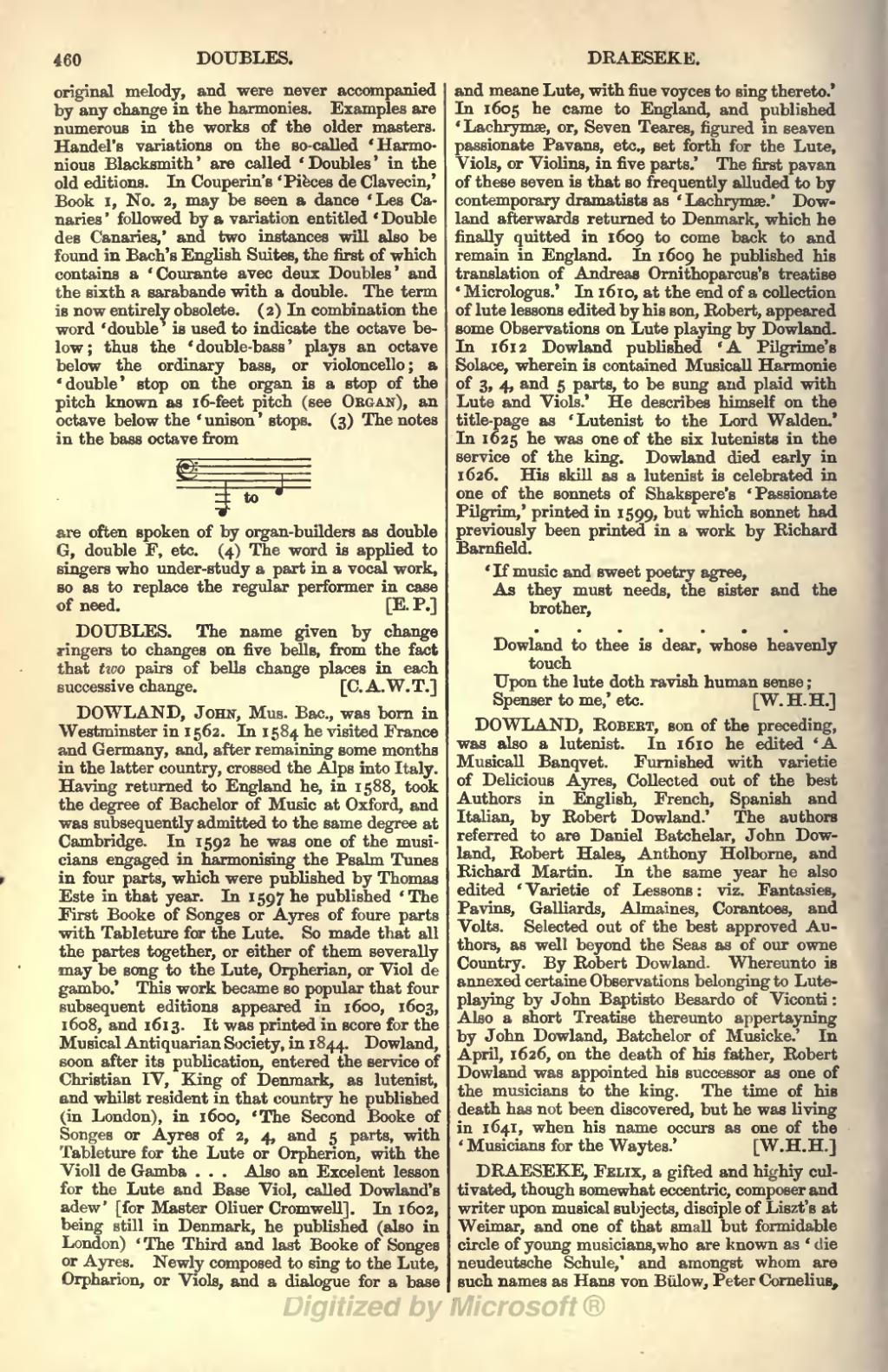original melody, and were never accompanied by any change in the harmonies. Examples are numerous in the works of the older masters. Handel's variations on the so-called 'Harmonious Blacksmith' are called 'Doubles' in the old editions. In Couperin's 'Pièces de Clavecin,' Book i, No. 2, may be seen a dance 'Les Canaries' followed by a variation entitled 'Double des Canaries,' and two instances will also be found in Bach's English Suites, the first of which contains a 'Courante avec deux Doubles' and the sixth a sarabande with a double. The term is now entirely obsolete. (2) In combination the word 'double' is used to indicate the octave below; thus the 'double-bass' plays an octave below the ordinary bass, or violoncello; a 'double' stop on the organ is a stop of the pitch known as 16-feet pitch (see Organ), an octave below the 'unison' stops. (3) The notes in the bass octave from

are often spoken of by organ-builders as double G, double F, etc. (4) The word is applied to singers who under-study a part in a vocal work, so as to replace the regular performer in case of need.
[ E. P. ]
DOUBLES. The name given by change ringers to changes on five bells, from the fact that two pairs of bells change places in each successive change.
[ C. A. W. T. ]
DOWLAND, John, Mus. Bac., was born in Westminster in 1562. In 1584 he visited France and Germany, and, after remaining some months in the latter country, crossed the Alps into Italy. Having returned to England he, in 1588, took the degree of Bachelor of Music at Oxford, and was subsequently admitted to the same degree at Cambridge. In 1592 he was one of the musicians engaged in harmonising the Psalm Tunes in four parts, which were published by Thomas Este in that year. In 1597 he published 'The First Booke of Songes or Ayres of foure parts with Tableture for the Lute. So made that all the partes together, or either of them severally may be song to the Lute, Orpherian, or Viol de gambo.' This work became so popular that four subsequent editions appeared in 1600, 1603, 1608, and 1613. It was printed in score for the Musical Antiquarian Society, in 1844. Dowland, soon after its publication, entered the service of Christian IV, King of Denmark, as lutenist, and whilst resident in that country he published (in London), in 1600, 'The Second Booke of Songes or Ayres of 2, 4, and 5 parts, with Tableture for the Lute or Orpherion, with the Violl de Gamba … Also an Excelent lesson for the Lute and Base Viol, called Dowland's adew' [for Master Oliuer Cromwell]. In 1602 [App. p.618 "1603"], being still in Denmark, he published (also in London) 'The Third and last Booke of Songes or Ayres. Newly composed to sing to the Lute, Orpharion, or Viols, and a dialogue for a base and meane Lute, with fiue voyces to sing thereto.' In 1605 he came to England, and published 'Lachrymæ, or, Seven Teares, figured in seaven passionate Pavans, etc., set forth for the Lute, Viols, or Violins, in five parts.' The first pavan of these seven is that so frequently alluded to by contemporary dramatists as 'Lachrymæ.' Dowland afterwards returned to Denmark, which he finally quitted in 1609 to come back to and remain in England. In 1609 he published his translation of Andreas Ornithoparcus's treatise 'Micrologus.' In 1610, at the end of a collection of lute lessons edited by his son, Robert, appeared some Observations on Lute playing by Dowland. In 1612 Dowland published 'A Pilgrime's Solace, wherein is contained Musicall Harmonie of 3, 4, and 5 parts, to be sung and plaid with Lute and Viols.' He describes himself on the title-page as 'Lutenist to the Lord Walden.' In 1625 he was one of the six lutenists in the service of the king. Dowland died early in 1626. His skill as a lutenist is celebrated in one of the sonnets of Shakspere's 'Passionate Pilgrim,' printed in 1599, but which sonnet had previously been printed in a work by Richard Barnfield.
'If music and sweet poetry agree,
As they must needs, the sister and the brother,
* * * * * * *
Dowland to thee is dear, whose heavenly touch
Upon the lute doth ravish human sense;
Spenser to me,' etc.
[App. p.618 "The following anagram on his name is given by Camden at the end of his 'Remaines':—
Joannes Doulandus.
Annos ludendo hausi.
"]
[ W. H. H. ]
DOWLAND, Robert, son of the preceding, was also a lutenist. In 1610 he edited 'A Musicall Banqvet. Furnished with varietie of Delicious Ayres, Collected out of the best Authors in English, French, Spanish and Italian, by Robert Dowland.' The authors referred to are Daniel Batchelar, John Dowland, Robert Hales, Anthony Holborne, and Richard Martin. In the same year he also edited 'Varietie of Lessons: viz. Fantasies, Pavins, Galliards, Almaines, Corantoes, and Volts. Selected out of the best approved Authors, as well beyond the Seas as of our owne Country. By Robert Dowland. Whereunto is annexed certaine Observations belonging to Lute-playing by John Baptisto Besardo of Viconti: Also a short Treatise thereunto appertayning by John Dowland, Batchelor of Musicke.' In April, 1626, on the death of his father, Robert Dowland was appointed his successor as one of the musicians to the king. The time of his death has not been discovered, but he was living in 1641, when his name occurs as one of the 'Musicians for the Waytes.'
[ W. H. H. ]
DRAESEKE, FELIX, a gifted and highly cultivated, though somewhat eccentric, composer and writer upon musical subjects, disciple of Liszt's at Weimar, and one of that small but formidable circle of young musicians, who are known as 'die neudeutsche Schule,' and amongst whom are such names as Hans von Bülow, Peter Cornelius,

